|
|
|
Sort Order |
|
|
|
Items / Page
|
|
|
|
|
|
|
| Srl | Item |
| 1 |
ID:
187033
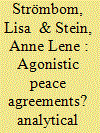

|
|
|
|
|
| Summary/Abstract |
Later years have seen the growth of a vibrant theoretical discussion on agonistic peace and the importance of creating space for contestation, plurality, and dissensus post-accord. However, there has been very few attempts at embedding agonistic theory in empirical analyses of peace agreements. This study attends to that lacuna by investigating how agonistic principles can be integrated and investigated in peace agreements. We suggest a threefold set of indicators for assessing the degree to which peace agreements are invested with agonistic dynamics: (1) what types of spaces for interaction are offered post-accord; (2) what forms of inclusion are stipulated; and (3) how is the peace agreement framed in terms of conflict termination and consensus/dissensus? We illustrate how the various indicators could be put into motion in concrete analyses applying them to examples from the Oslo Accords, the Belfast Agreement, and the Colombian Peace Agreement. Finally, we discuss four dilemmas and problematiques of integrating agonistic ideas in peace agreements; the issue of power, the mixing of agonistic and liberal ideals in peace agreements, the principle of ‘nothing is agreed until everything is agreed’ and the related double-edged potential of constructive ambiguity and finally the challenges of implementing peace agreements.
|
|
|
|
|
|
|
|
|
|
|
|
|
|
|
|
| 2 |
ID:
082447


|
|
|
|
|
| Publication |
2008.
|
| Summary/Abstract |
The fact that civil society groups play important roles in post-conflict peacebuilding has entered the mainstream of international conflict resolution dogma. Rarely do local civil society groups get a seat at the negotiation table for peace accords. Although the exclusion of civil society from peace negotiations may streamline the process, the absence of civil society voices and interests at the negotiating table can negatively impact the sustainability of a peace agreement during peacebuilding. Surveying a wide variety of different peace processes, a strong correlation was found between active civil society participation in peace negotiations and the durability of peace during the peacebuilding phase. Cases in which civil society groups actively engaged in peace negotiations seemed to enjoy more sustained peace in the peacebuilding phase. This holds true also for cases in which civil society groups did not have a direct seat at the table, but did exercise significant influence with the negotiators because they were democratic actors. War resumed in many cases not characterized by direct or indirect civil society involvement in the peace negotiations. No claim of causality is made; the sustainability of peace surely rests on causes as complex and dynamic as the initiation of war does. However, these findings do call attention to the need for further research to understand the special impact that civil society inclusion at the peace table may have
|
|
|
|
|
|
|
|
|
|
|
|
|
|
|
|
| 3 |
ID:
159572
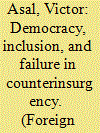

|
|
|
|
|
| Summary/Abstract |
Why do the strong lose? Intuitively, stronger violent actors should win in wars against weaker actors. The literature on insurgencies suggests that democracies will do worse than other countries. However, there is little quantitative literature on why states succeed or fail in their efforts against insurgencies, and the key works find that democracy does not matter. We argue that the combined effect of political inclusion and political competition present in inclusive democracies is a key missing component impacting the success or failure of counterinsurgency (COIN). When procedural elements of democracy are combined with political inclusion, countries are less likely to be successful at suppressing insurgencies because normatively they are less willing to be as repressive and ruthless as necessary. We find that inclusion and procedural democracy separately have no impact on COIN success; however, when combined, the impact is significant, large, and negative. Inclusive democracies lose COIN operations more often than their counterparts.
|
|
|
|
|
|
|
|
|
|
|
|
|
|
|
|
| 4 |
ID:
168853


|
|
|
|
|
| Summary/Abstract |
The need to create an efficient, nonpartisan public service that would reflect the population of African colonies approaching independence rather than the colonial rulers and meet the needs and aspirations of those people was one of several critical issues to emerge in the late 1950s. The article focuses on the issue in Kenya. The decolonization process created a need for change in the composition of the public service brought forth competing views as to the best way to achieve an inclusive and efficient civil service, particularly with regard to its structure. This became a subject of contention during the constitutional conferences held during the period 1960–1963 to plot the constitutional path to independence for the British colony. The nationalist political parties put forward contrasting visions for the public service in independent Kenya. The article details this as well as the attitude of the colonial power as Kenya sought the best way to establish a civil service that would provide service to the public from qualified individuals representing Kenya’s diverse population. While the self-government constitution (June 1, 1963) provided for eight public service commissions, this was drastically changed to a single public service commission in the independence constitution (December 12, 1963). The alteration was insisted upon by independent Kenya’s first government, but it came to be viewed as a disservice to the public through failure to produce a nonpartisan and inclusive public service.
|
|
|
|
|
|
|
|
|
|
|
|
|
|
|
|
| 5 |
ID:
187342
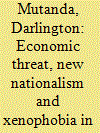

|
|
|
|
|
| Summary/Abstract |
The perceived economic threat has given rise to narrow nationalism in South Africa, which has given birth to direct, cultural and structural forms of violence, commonly referred to as xenophobia, which is actually Afrophobia. The main argument is that in as much as there is evidence of the influx of mainly African migrants in South Africa, and these have been largely accused of various crimes and contributing to rising unemployment, this perception trivialises the need for a multipronged and people-centred approach to South Africa’s and Africa’s underlying domestic challenges. Xenophobia should not be seen as only a South African but also an Africa problem, which consequently requires a national and continental response strategy. This then implies that South Africa has a role in stemming the challenges that have given impetus to a new form of narrow nationalism. On the other hand, the article attempts to explain what a continental response strategy might entail. In fact, the narratives of African migrants as pervasive criminals and job snatchers conveniently relieves the post-apartheid government which is expected to enhance service delivery and create opportunities for the locals, as well as giving dignity to the immigrants.
|
|
|
|
|
|
|
|
|
|
|
|
|
|
|
|
| 6 |
ID:
165668
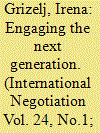

|
|
|
|
|
| Summary/Abstract |
Literature examining the participation of youth during peace processes is limited. Previous work has often focused on youth as “peacebuilders” and agents of change or threats to peace in the post-accord period, with little emphasis on how young people participate during the negotiation phase. This article seeks to fill this gap by assessing youth inclusion and participation in Myanmar’s ongoing peace negotiations. The study finds that, while youth have not had formal inclusion avenues in the peace negotiations, there are cohorts of young people who perceive themselves to be legitimate stakeholders in the peace process, who have attempted to gain access to decision-making in the peace negotiations, and have played active roles in supporting the process. It is argued that recognizing youth as key stakeholders in the peace accord will play a vital role in building sustainable peace within Myanmar’s nascent democracy.
|
|
|
|
|
|
|
|
|
|
|
|
|
|
|
|
| 7 |
ID:
169047
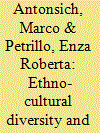

|
|
|
|
|
| Summary/Abstract |
Migration is often said, in the public discourse, to pose a threat to the nation. Yet, Western societies are undergoing an irreversible demographic change spurred in great part by international migration. Thus, the question about how to reconcile nation and diversity remains of crucial importance for many countries. By focusing on the case of Italy, the article attends to this issue, by exploring the response of leftist political parties. We analyse parliamentary debates and laws related to immigration and integration issues (1986–2014), focusing specifically on the Turco-Napolitano Law (1998), possibly the most progressive legislative attempt at incorporating migrants into the Italian nation. Our analysis shows a clear incongruence between the pluralist rhetoric of the political left and its legislative acts on migrants’ national incorporation. This finding is used to reflect on the limits and possibilities of the very idea of inclusive nation in the age of migration.
|
|
|
|
|
|
|
|
|
|
|
|
|
|
|
|
| 8 |
ID:
189919
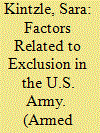

|
|
|
|
|
| Summary/Abstract |
The promotion of inclusion in the U.S. Army requires an understanding of how and why exclusion occurs. As exclusion can have deleterious impacts at both and individual and organizational level, reducing exclusive behaviors can have positive effects on Soldiers and the Army. To explore exclusion in the Army, 19 focus groups were conducted with 120 active-duty enlisted Soldiers. Two rounds of thematic analysis revealed four themes related to exclusion. Participants indicated exclusion to be often based on low or bad performance, personality factors that were identified as different or toxic, cliques within the Army unwilling to welcome others, and gender, with both men and women identifying exclusionary behaviors toward women within and outside of the work environment. Research findings offer insight into how and why exclusion occurs and how such behaviors can be addressed in the U.S. Army including training and addressing cultural and systemic barriers to inclusion.
|
|
|
|
|
|
|
|
|
|
|
|
|
|
|
|
| 9 |
ID:
131475
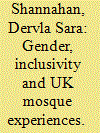

|
|
|
|
|
| Publication |
2014.
|
| Summary/Abstract |
Access to, management and attendance of places of worship often takes gendered forms. Gender imbalances in UK mosques manifests in attendance and management patterns and is reflected in the facilities available. The sense that mosques are perceived widely as 'prayer-clubs for men' (Maqsood 2005: 4-5) is often reflected in the physical spaces and facilities made available to female worshippers, and it must be noted that some mosques do not provide any of the latter at all (Dispatches 2006). Shockingly, a recent survey found that 'women form part of the congregation in [only] half (51%) of the organisations surveyed' (Coleman 2009: 10). Relatedly, UK Mosque management committees privilege male involvement, decision-making and leadership roles, with figures of as few as 15% women in management positions (Asim 2011: 34) and more who 'will simply not entertain the idea' (Asim 2011: 39). Such imbalances reflect the specificities of the UK-religious context (Maqsood 2005) yet, globally, women's mosque involvement appears to be changing far more rapidly than here. This paper explores how gender, religious identity and sexualities interface with women's mosque access, involvement and experiences therein. It draws upon original research with a sample of women, and indicates that inclusivity is an important topic in UK mosques, far beyond gender
|
|
|
|
|
|
|
|
|
|
|
|
|
|
|
|
| 10 |
ID:
087281
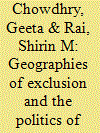

|
|
|
|
|
| Publication |
2009.
|
| Summary/Abstract |
In this essay, we argue that race has yet to be integrated as an analytical category shaping the study and teaching of international relations. We suggest that although the issues of race and gender are systematically coded into central concepts in the discipline, they are made invisible through a "series of ontological and epistemological maneuvers." Focusing on two concepts central to the discipline-sovereignty and the nation-state-we suggest that race can be better integrated into the teaching of international relations by focusing on the ways in which these maneuvers structure the geographies and politics of exclusion and inclusion in international relations. We conclude that raising questions about the ways in which race is taught in the academy is in itself critical-what we teach, how we teach, and who teaches are all questions that need repeated airing for achieving interpretative autonomy as well as a transformative politics.
|
|
|
|
|
|
|
|
|
|
|
|
|
|
|
|
| 11 |
ID:
165663
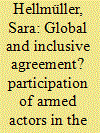

|
|
|
|
|
| Summary/Abstract |
This article provides an analytical framework to understand how participation of armed actors in peace negotiations influences local violence. It argues that the link between violence and exclusion or inclusion of armed actors is often indirect and depends on armed actors’ underlying motivations to be included and their corresponding strategies. Based on an analysis of the Congolese peace process from 1999 to 2003, the article assesses how the mandate of the peace process influenced armed groups’ motivations to be included. It then analyzes the strategies that armed actors used to be included and examines their impact on local violence. Thereby, it allows for a more nuanced understanding of how participation of armed actors in a mediation process influences prospects for peace.
|
|
|
|
|
|
|
|
|
|
|
|
|
|
|
|
| 12 |
ID:
190213
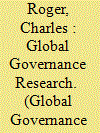

|
|
|
|
|
| Summary/Abstract |
Global governance has been widely embraced as an object of analysis and as a way of “seeing” world politics. Yet we still know little about how publishing has evolved. This article presents the first systematic exploration of these patterns. It uses an original dataset of global governance research to answer three first-order questions: How has publishing varied over time? What issues have scholars focused on? And who has been publishing in the field? The authors found that research has grown and become increasingly diverse—but selectively so. Some marginalized issues feature more prominently than in the rest of international relations, but there are blind spots too. Further, while research is less American and women have been comparatively more active relative to other areas, geographical diversity remains extremely limited. Scholars based in the Global South have been the first authors of less than 14 percent of all publications. To conclude, the article reflects on implications for the field.
|
|
|
|
|
|
|
|
|
|
|
|
|
|
|
|
| 13 |
ID:
180887


|
|
|
|
|
| Summary/Abstract |
Completed negotiations often end in shortfalls, half glasses, and way stations. Is that enough to claim success and is a half-loaf sometimes sufficient? The nine articles in this thematic issue examine various forms of incomplete negotiations, from a full-worded agreement that is bypassed, through a formal ceasefire, an agreement among only the agreeables, a mediated but non-transforming agreement, a confidence-building agreement, and finally, claimed resolution that drives violence underground. Sufficiency has different meanings in each case, but generally refers to making some progress in handling the conflict, whereas insufficiency refers to not making progress at any level that is lasting.
|
|
|
|
|
|
|
|
|
|
|
|
|
|
|
|
| 14 |
ID:
172316
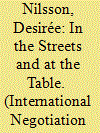

|
|
|
|
|
| Summary/Abstract |
When bringing armed conflicts to a peaceful end, the inclusion of civil society in peacemaking is a vital task. However, whereas previous research on civil society inclusion has made significant advancements, surprisingly little attention has been paid to analyzing how civil resistance and mass action may interact with more elite-driven approaches during peace processes. This study addresses this research gap by examining the interplay between elite and mass-based civil society approaches in three different peace processes in civil wars in Africa in the post-Cold War period: Liberia, the Central African Republic (CAR), and Burundi. We advance the literature by developing a framework that focuses on coordination of these different efforts and we explore this interplay empirically. With this study, we aim to broaden the research agenda, allowing for future synergies at the research frontier of mass action and the inclusion of civil society in peace processes.
|
|
|
|
|
|
|
|
|
|
|
|
|
|
|
|
| 15 |
ID:
165661
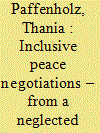

|
|
|
|
|
| Summary/Abstract |
The objective of this special issue on inclusive peace negotiations is to advance the debate on negotiations. It sheds light on included and excluded actors, in particular political parties, civil society, business, youth and religious actors, and those armed actors that are either excluded or included. This special issue is particularly interesting as all articles combine a conceptual introduction of the role of the discussed actor in question in peace negotiations with a case study approach. This method enriches conceptual discussion and debates on the role of the various actors through analyses of several peace negotiations, including among others, DRC, Kenya, Liberia, Sierra Leone, Somalia, Guatemala, El Salvador, Bosnia & Herzegovina, Macedonia, Great Britain and Northern Ireland, and Myanmar.
|
|
|
|
|
|
|
|
|
|
|
|
|
|
|
|
| 16 |
ID:
160407
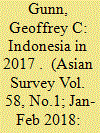

|
|
|
|
|
| Summary/Abstract |
In mass demonstrations spearheaded by a coalition of Islamic radicals, 2017 witnessed a polarizing assault on the nation’s broadly secular founding creed, Pancasila. With the arrest and imprisonment of the popular ethnic-Chinese Christian mayor of Jakarta on spurious blasphemy charges, even the Indonesian president was left on the back foot and obliged to push back.
|
|
|
|
|
|
|
|
|
|
|
|
|
|
|
|
| 17 |
ID:
171803
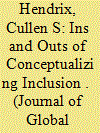

|
|
|
|
|
| Summary/Abstract |
In the field of global security studies, inclusion, both in terms of process and outcomes, is certainly having a moment. Like many terms widely adopted by the international security and development communities, the utility of the discourse around inclusion stems in part from its ambiguity. The various contributions to this special issue make good and productive use of this ambiguity and have moved the discussion of inclusive approaches to governance, violence reduction, and peace-building forward. In doing so, however, they have put forth very different conceptualizations and operationalizations of inclusion and exclusion. Thus, my contribution to this symposium identifies these various conceptualizations, discusses the strengths and weaknesses of proposed measures, and concludes with remarks on the normative implications of these analyses.
|
|
|
|
|
|
|
|
|
|
|
|
|
|
|
|
| 18 |
ID:
166690
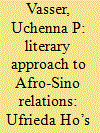

|
|
|
|
|
| Summary/Abstract |
The Afro-Sino engagement supports the study of international relations beyond the framework of a West-centric narrative. Ken Kamoche’s fictionalisation of African immigrants in China, and Ufrieda Ho’s narration of the vicissitudes of Chinese communities in South Africa, contemplate the consequence of the Africa–Asia engagement on the human condition. While the attendant political apparatuses in the African continent and China laud the mutual benefits of engagement, Kamoche and Ho, by focusing on issues of transmigration, displacement and belonging, identity-formation, and so forth expose the acute Sinocentrism and Afrocentrism that impede the seamless establishment of migrant communities in both geopolitical spaces. The principal objectives of this essay involve a close reading of Kamoche and Ho’s novels to focus on the non-state participants of the Afro-Sino relations, and to discuss the emerging transnational, migrant literature that is at once African and Chinese. Ultimately, this essay suggests the formulation of a literary subgenre to embrace the Afro-Sino literary imagination.
|
|
|
|
|
|
|
|
|
|
|
|
|
|
|
|
| 19 |
ID:
082450
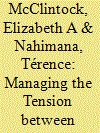

|
|
|
|
|
| Publication |
2008.
|
| Summary/Abstract |
The tension between inclusive and exclusive approaches is present throughout peace processes. The challenge of facilitators, mediators, and parties alike is to determine how to manage these tensions, how to integrate various processes into a comprehensive whole and ensure that those required to implement the peace agreement have access to the process that creates the peace agreement. In particular, how can civil society, an actor of ever-increasing importance in the implementation of peace agreements, be effectively included in the design of the accords? This article examines the tension between inclusive and exclusive processes within the context of the Burundi peace process and the development of the Arusha Peace Accords.
|
|
|
|
|
|
|
|
|
|
|
|
|
|
|
|
| 20 |
ID:
151596
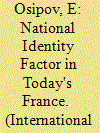

|
|
|
|
|
| Summary/Abstract |
THROUGHOUT SEVERAL DECADES, starting with the 1970s, political life in France was unfolding as the right-left opposition. Strong political alliances on both sides and the majority electoral system made second rounds of presidential and parliamentary elections inevitable. Dichotomy was spread to the country's entire population: all and every Frenchman referred himself/herself to one of the political flanks, the political bias being normally inherited from the older generations. We can even say that the right or left political preferences have become one of the most important self-identification features of the citizens of the Fifth Republic.
|
|
|
|
|
|
|
|
|
|
|
|
|
|
|
|
|
|
|
|
|